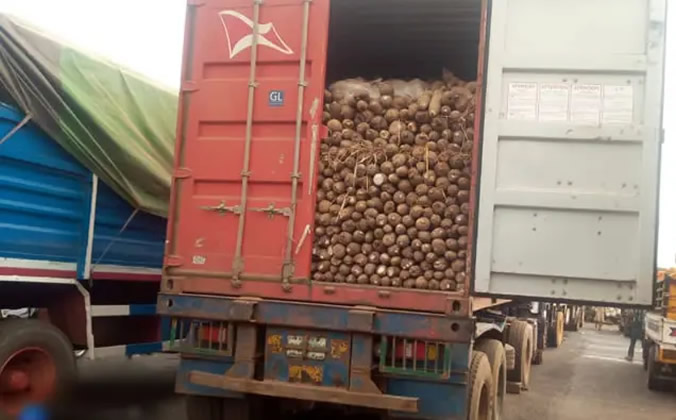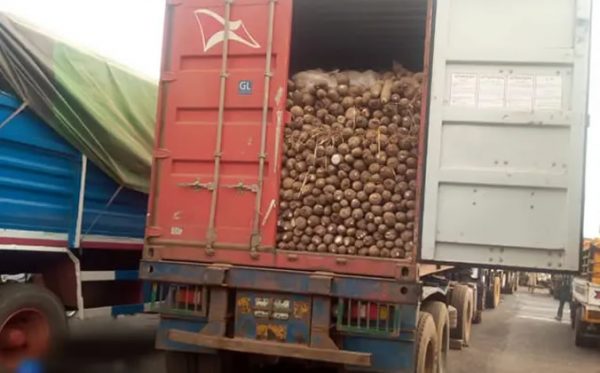Late in February, the Amalgamated Union of Foodstuff and Cattle Dealers of Nigeria (AUFCDN) imposed a blockade on the movement of food products to the south. The reason: a violent conflict between traders of northern origin and natives in Shasha, Ibadan, which had led to the destruction of property belonging to traders of northern origin.
Read more about Business
The restriction has since been lifted, partly because the Federal Government has agreed to compensate the affected persons. But this wasn’t after food prices in the south had skyrocketed, and huge volumes of produce in the north had gone to waste.
Apparently, the merchants who had halted the movement of food into southern states believed that they could wield their products (or the absence of those products) as a weapon against their targets. They thought that the southern market could be severely impacted by such a measure.
But did this move really make economic sense? Was it possible for the blockade’s initiators to achieve their aim without incurring significant costs themselves?
The answer, as always, can be found by analyzing data relevant to the issue. Here’s what it says.
Where’s The Market At?
The AUFCDN has an overwhelmingly northern outlook because a majority of Nigeria’s cattle and a large fraction of its food are grown by northerners. As part of their protest, members of the organization planned to divert their products to local markets in the north, or sell them to neighbouring countries.
But there’s a problem with this strategy. It turns out that Southern Nigeria presents a bigger market for the North’s food products than what Northern states can offer. That’s because, taken together, southern states spend more on food than their northern counterparts.
This is borne out by the NBS’ report on Consumption Expenditure Pattern in Nigeria, which reveals how much money Nigerians spent on food and non-food items in 2019.
Find our comprehensive listings of businesses in Nigeria here https://businesses.connectnigeria.com/
According to that report, people in Northern states (excluding Borno) spent ₦9.41 trillion on food in 2019. For southern states, the figure was ₦13.37 trillion. Given these figures, it’s only rational that a merchant in the north would want his or her produce to be sold in the south.
This fact becomes more obvious when we look at what individual states spend on food. Of the top five states in terms of food expenditure, only one—Kano, which comes fifth –is a northern state. The top four are Lagos, Oyo, Delta, and Rivers States, in that order. But of the bottom four spenders, three are northern—Yobe, Nasarawa, and Taraba (the exception being Ebonyi).
It certainly doesn’t make economic sense to halt supplies to your biggest markets, just to make a point.
Mutually Assured Losses
As expected, while food prices soared in the south, they collapsed in the north. Traders couldn’t get their money’s worth for what they sold, because they were supplying more to their local market than they needed. There was also a lot of food spoilage.
But the south does depend on the north for a fair bit of its food needs. Take starchy roots like yams, for instance. The top yam-producing states are Benue, Taraba, Nasarawa, and Adamawa—located either in the North Central or North-Western regions. Northern states are also leaders in the production of rice and tomatoes.
While the north produces a greater portion of these items, the south spends more on them. This is true of meat, which mostly comes from cattle grown in the north. Northern states purchased meat worth ₦444 billion in 2019. Compare this to the ₦744 billion spent by southern states on meat in the same period, and you’ll see how pausing meat shipment to the south was probably a bad idea.
Despite claims of a politically-inspired settlement, it’s safe to say that no side came out unscathed from the whole situation and that it was in their best interest to have the dispute resolved.
The Joys Of Trade
The tug-of-war over north-south trade does affect the politics of Nigeria. A sustained blockade would have broadened already existing regional divides. The Federal Government was almost certainly going to step in at some point. Thankfully, their intervention may have doused the flaming tensions a bit.
There’s a lesson to be learned here: trade works when it benefits all parties involved. This is the beauty of trade. And it’s a pointer to something that Nigeria needs to get right. If the country will succeed as a geopolitical entity, it should also benefit all of its stakeholders.
Featured Image Source: Punch Newspapers
Got a suggestion? Contact us: [email protected]


